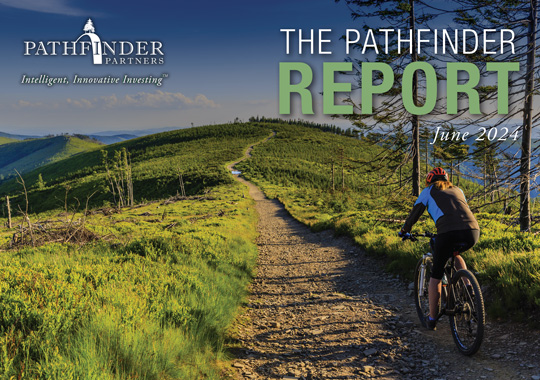Finding Your Path
Lessons from the WeWork Debacle
By Lorne Polger, Senior Managing Director

Although we do not invest in the office sector, I’ve followed with a keen eye the roaring success and subsequent dismal failure of WeWork, the office investment company known for its hip co-working environments.
WeWork professed to be a revolutionary technology start-up. The reality was quite different. Notwithstanding the catchy logo, marketing and space design, WeWork was, at its core, an office landlord that subleased its space and grew without control of operating costs. Investors, even incredibly savvy ones like SoftBank’s Masayoshi Son, were so busy looking for the next unicorn (a startup with billion-dollar+ value) that they overlooked an important detail. The company’s costs grew faster than its revenue.
WeWork was not the first to go down this slippery slope and they won’t be the last. Faced with losses, most well-managed companies would slow growth and concentrate on profitability. Instead, co-founder and CEO Adam Neumann raised more and more capital (at higher valuations!) hoping to “work his way out of the hole” by increasing the paper value of the business. Of course, that’s a house of cards.
 WeWork grew rapidly. In 2014, their revenue was $74 million; its operating loss was $88 million. By 2019, the year Neumann left the company, its revenue had climbed to over $3 billion, and it was valued at an astonishing $47 billion. But its debt grew as fast as its revenue. That same year, its losses came in at $3.3 billion. Those losses peaked in 2021 at $4.4 billion. Growth is great if profit is a part of it. But growth for growth's sake is a dangerous concept.
WeWork grew rapidly. In 2014, their revenue was $74 million; its operating loss was $88 million. By 2019, the year Neumann left the company, its revenue had climbed to over $3 billion, and it was valued at an astonishing $47 billion. But its debt grew as fast as its revenue. That same year, its losses came in at $3.3 billion. Those losses peaked in 2021 at $4.4 billion. Growth is great if profit is a part of it. But growth for growth's sake is a dangerous concept.
The house of cards collapsed with WeWork’s chapter 11 bankruptcy filing in 2023. Their bankruptcy schedules listed $15 billion of assets and about $19 billion of debt.
I’ve learned more from my mistakes than my successes. As entrepreneurs, investors, and mentors to other young entrepreneurs, we believe there are several prudent lessons from the WeWork story.
Create a Win-Win Financial Structure at the Outset.
WeWork raised over $12 billion privately. Yet, notwithstanding the skyrocketing valuations, even early investors were crushed in the end. In an article on the company, Bloomberg noted:
“WeWork has become an extreme example of the excesses afforded to technology entrepreneurs in the era of unicorns. Neumann was able to raise billions of dollars at astronomical valuations and spend freely, while retaining effective control over operations through special classes of stock.”
Many critics of WeWork pointed out that the primary person who stood to profit from the company’s IPO was its CEO. That’s an inherent conflict of interest.
When Mitch Siegler and I started Pathfinder in 2006, one of our key tenets was to create a win-win investment relationship with our investors. We avoided heavy fees (large acquisition fees that are paid regardless of the success of the investment; disposition, debt placement and recapitalization fees, etc.) or getting paid regardless of how our investors did. By structuring our investment funds in a manner where most of our profits are derived from shared winnings, we created an alignment of interest with investors. As we’ve said for years, the general partner should only win if all partners win as well. When we invest with and/or mentor others, we continue to strive for that alignment of interest between sponsors and investors.
Adopting Good Governance Rules.
A strong and healthy Board of Directors can provide important strategic direction, industry expertise or connections, and accountability. This was missing from WeWork. Neumann took $700 million out of the company just before the IPO. He also owned properties that WeWork then rented – a conflict of interest. A strong Board could have steered WeWork away from conflicts of interest and might have allowed the company to prosper.
It’s not uncommon for startups – or even older, closely-held businesses – to lack a strong governance structure. It’s much easier to run hard with the founder in charge, without guardrails. But savvy investors expect more.
Pathfinder is a partnership, which brings inherent checks and balances. We also created an advisory board 15 years ago. While advisory in nature, this group has provided tremendous feedback on important decisions, including those relating to key strategic decisions and governance. Good governance and checks and balances are key features we look for when we invest in and mentor other companies.
Using Your Talent the Right Way.
Neumann was a gifted salesman and visionary and a prolific fundraiser. And the more money he raised, the more he enriched himself.
Ironically, for someone who preached about creating connected communities, he was massively self-centered. In hindsight, his role should have been as visionary and fund raiser, while leaving the business operations to those with that strength. I recall sitting in a meeting with my Vistage chapter (a group of senior business executives) about ten years ago. The speaker was a former founder and CEO who had led his company’s growth to over 500 employees. At one point, they started to focus more on profits than growth and decided to downsize. His view? “We did not have the right people on the bus.” You could also ask yourself; do you have the right people in the right roles for their strengths? Sally may be tremendous at marketing, but is she the right person for the investor relations role? Tom may be a great salesperson, but is his role as a sales manager the right fit? WeWork brought folks on to fuel growth, but not profitability.
Understand What Sustainable Growth Looks Like.
Taking the right decisions for your business sometimes means compromising. It is impractical to try and expand beyond your means, so you must be realistic about your investments.
WeWork spent like drunken sailors. They snapped up properties in the most expensive areas of the most expensive cities. While this may have impressed investors and clients, it was not sustainable. Many of our competitors in the apartment world did the same things in 2021 and 2022, when prices were at all-time highs. How did they typically justify it? They had capital to deploy, and they could make the investments work with high leverage, typically at floating rates. Ugh. As we are seeing now that story doesn’t end well (small plug…unless you’re a prudent investor who has been waiting on the sidelines for a couple of years to pounce on those opportunities…ask us about Pathfinder Multifamily Opportunity Fund IX).
As challenging as it can be to simply wait and bide your time can be (we sat on the sidelines for the past two years), planning smaller and more achievable steps to maintain forward momentum creates a more solid foundation for long-term growth and success.
Do Not Underestimate Your Risks.
No entrepreneur is entirely risk averse, but understanding the line between manageable risk and unmitigated risk is critical. Neumann did not understand that distinction. To drive down the rates it paid to landlords, WeWork would typically sign 15-year leases, much (much!!) longer than the industry standard, which these days is 3-5 years. Given that their business model was to then sublet their space on a short-term basis to its co-working tenants, the company was continuously scrabbling to reduce churn, without any assurance that it could meet its obligations.
When Covid-19 hit and demand for office space fell away, all WeWork could do was try to negotiate its way out of bad leases. House of cards.
We’ve mitigated our risks at Pathfinder over the years with multiple strategies. We use primarily fixed rate debt and match the term of the debt with the term of our funds. We don’t over leverage (today, we are less than 60% leveraged across our portfolio of 36 apartment communities). We don’t cross collateralize assets. We underwrite conservatively. We maintain sufficient property and liability insurance. We haven’t chased deals in the next “you gotta be here” place (Boise and Orlando come to mind). Risk planning should be front and center in every discussion about growth.
Be Prepared to Pivot.
 WeWork had no plan B. The company exploded and expanded when money was cheap, and demand was high. They were crushed when the pandemic changed how and where people work. They had no other direction and could only plough ahead in the same manner, struggling to service their massive debt in the face of rising interest rates.
WeWork had no plan B. The company exploded and expanded when money was cheap, and demand was high. They were crushed when the pandemic changed how and where people work. They had no other direction and could only plough ahead in the same manner, struggling to service their massive debt in the face of rising interest rates.
Agility is key because the business landscape is always shifting. We started our business in 2006 with a singular focus on distress. When the distress ran its course around 2012, we pivoted to focus on value-add investments. When the value-add space got overheated, we pivoted to focus on core plus investments. And now, we’re pivoting again to refocus on distressed and opportunistic investing. As a business owner, you must continually ask yourself if your company has the capacity to change direction?
My takeaway from WeWork: there must be a balance between rapid growth and level-headed planning. There needs to be something to fall back on when times get tough.
Establishing A Point of Difference.
For all the hype about WeWork’s disruptive presence, the basic elements of their business were surprisingly traditional. It was a commercial property company in a world full of commercial property companies. It had its own style, of course (espresso machines and kombucha in the fridge), but a major reason for its downfall was oversupply in the sector.
What is your point of difference? How are you better at something than others? Or as many investors have asked us over the years, what is your secret sauce?
Transparency.
Many WeWork backers were dazzled by the Silicon Valley sheen that distracted them from its prosaic structure and by some of the conflicts of interest just below the surface. We think that providing complete transparency to investors (full audits, detailed quarterly reports, annual meetings, etc.) is a critical component to long-term success. When it comes to investing, the news is not always good. If you are not completely transparent when the news is bad, it’s going to come back and bite you.
Conclusion.
Greed, avarice and a lack of guardrails on growth typically do not end well. WeWork’s story reminds me of a quote from a real estate book I read long ago: “As you build your real estate empire, don’t get lost in greed and ambition. Whether through your money, your time, your knowledge, or something else: give back.”
― Brandon Turner, “How to Invest in Real Estate: The Ultimate Beginner's Guide to Getting Started”
Lorne Polger is Senior Managing Director of Pathfinder Partners. Prior to co-founding Pathfinder in 2006, Lorne was a partner with a leading San Diego law firm, where he headed the Real Estate, Land Use and Environmental Law group. He can be reached at lpolger@pathfinderfunds.com.
Share this Article
IN THIS ISSUE
PATHFINDER MULTIFAMILY OPPORTUNITY FUND IX, L.P.
Multifamily Opportunity / Value-Add Fund
CHARTING THE COURSE
What Schrödinger’s Cat Tells Us About Inflation and Interest Rates
FINDING YOUR PATH
Lessons from the WeWork Debacle
GUEST FEATURE
Real Estate Reimagined: A Surge in Apartment Conversions
ZEITGEIST
News Highlights
TRAILBLAZING
Accessory Dwelling Units
NOTABLES AND QUOTABLES
Opportunity
